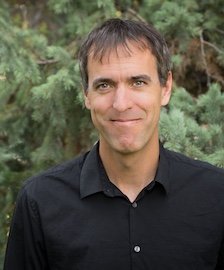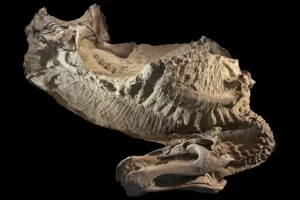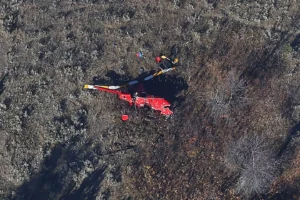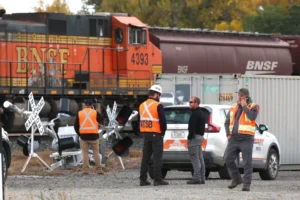BRAIN DRAIN: Wyoming Taking Action to Address Exodus of Young, Educated Workers
Programs under state initiative aimed at diversifying the economy
- Published In: Other News & Features
- Last Updated: Dec 05, 2022

By Shen Wu Tan
Special to the Wyoming Truth
What is the fate of a state that keeps losing its college graduates and young professionals to neighboring states with more diversified economies and cultural opportunities?
That’s a question lawmakers and educators are poised to address.
It’s a phenomenon called “brain drain”–and Wyoming has been grappling with it for years. Thousands of highly trained and educated folks flee the Cowboy State every year seeking better pay, job opportunities or living conditions elsewhere, data shows. In fact, a 2020 report from McKinsey & Co. revealed that about 66% of University of Wyoming graduates relocate after earning their degrees, many of whom migrate to surrounding western states.
Some stakeholders are trying to figure out how to stop the exodus. One of them is Rep. Shelly Duncan (R-Lingle), a member of the House Minerals, Business and Economic Development Committee. A willingness to change, she said, is the key.

“There’s just this divide in our state culturally of we don’t want anyone coming in,” Duncan told the Wyoming Truth. “We don’t want anyone telling us what to do. We want things to stay and remain the same. But if you do that, there are towns we’ve seen across the state that have dried up and died. You know, how many main streets across the state are no longer thriving? There is a price and a consequence we pay for not [being] willing to change.”
She added, “. . . One of the biggest exports that we have of resources is our youth because there’s nothing here to hold them…We’re importing retirees and exporting young workers. That’s not going to help our economy.”
Jordan Stauffer, 21, is one future export: He plans to leave Wyoming once he completes his computer science education at the University of Wyoming (UW).
“I have an aunt in my family that works in Amazon; she works out of Seattle,” said Stauffer, now enrolled in Casper College and on track to enroll at UW next fall. “Bigger cities just have more infrastructure for that kind of stuff.”
For example, Stauffer cited internet and broadband as not being “up to par” in Wyoming.
“There’s just not as much infrastructure for these kinds of jobs in Casper or in Wyoming,” he added.
Stauffer is considering moving to Colorado, where, he said, there are more computer science jobs than in Wyoming. But he’s also open to Texas or Seattle.
Ed Seidel, president of UW, told the Wyoming Truth, “Certainly, some of the graduates who leave Wyoming do so because they have a desire to live elsewhere and pursue other opportunities. Others leave because of a lack of job opportunities in their chosen fields…It’s something that multiple generations of state and university leaders have been concerned about and worked to address. The general consensus is that retaining more of our graduates would contribute to the state’s prosperity and help move the state forward.”
Betting on tourism
So what can be done to combat brain drain? Wenlin Liu, chief economist for the Wyoming Economic Analysis Division, and several former Wyoming residents believe economic diversification could be the answer.
UW and state officials are collaborating to do just that through the Wyoming Innovation Partnership. The university recently launched several new programs through this effort, including its School of Computing, the Wyoming Center for Entrepreneurship and Innovation and the Wyoming Outdoor Recreation, Tourism and Hospitality (WORTH) Initiative.

Tourism is the second-largest industry in Wyoming after the energy sector, according to Dan McCoy, the interim director of the WORTH Initiative. He noted it’s also the largest private employment sector in the state with over 30,000 workers.
“I would say that outdoor recreation, tourism and hospitality industries hold some of the greatest potential to retain UW graduates in Wyoming,” McCoy said. “There are literally thousands of employment opportunities throughout the state in the tourism sector. In the private sector, graduates can work as managers in hospitality operations, special events, outdoor recreation providers like guides, retail, or manufacturing, etc.”
WORTH plans to onboard an employment and internship coordinator to help build relationships with employers and internship providers and to connect students enrolled in tourism or hospitality-related degrees at UW to these opportunities. Staff also are raising funds to award grants to students who choose an internship that will keep them in Wyoming.
Additionally, the initiative is hiring an economist who can provide a better understanding of tourism and outdoor recreation investments for the state, adding a tourism extension educator, and assessing the need for new educational offerings to serve the tourism, hospitality and outdoor recreation industries. It is also developing an online tourism ambassador training program and compiling a report on the latest research and economic information about outdoor recreation in Wyoming.
Providing students with computing and tech skills
Another program aimed at diversifying the economy is UW’s School of Computing, which was founded in January to arm students with computing and digital skills. The school is collaborating with community colleges to offer more pathways for students to pursue technology-related degrees and developing partnerships with Wyoming companies.
“We know that our companies in Wyoming find it hard to recruit the computing and tech talent they need to thrive and expand in Wyoming, and we also know that our students can find it challenging to pursue their tech-related careers in Wyoming,” said Gabrielle Allen, the school’s director.
“We want to address this at different levels, providing more talent to Wyoming through new undergraduate, graduate and post-baccalaureate student programs, making sure that our students have the experiential learning necessary to thrive in their careers, and working with other student programs to expand digital skills in all majors.”
While the computing school has a few students working on projects, staff are hiring faculty and research scientists and reviewing the first academic program – a minor in computing that can complement any major at UW. The hope is for students to enroll in this minor next fall, with more degree options, including majors in computing and applied software development following shortly, Allen said.
Although Wyoming has some well-paying tech jobs, Allen acknowledged that the state needs more robust pipelines for students to secure these positions and more students need the training to effectively prepare for them.
“We also want to create more jobs, and create jobs across the state to help support our rural towns,” Allen said.
Stauffer, the computer science student at Casper College, is concerned that Wyoming’s economy is almost exclusively focused on the oil, gas and natural resources sector, which limits opportunities for careers that require a college degree.
“I would say a good percentage of the people I went to school with at Natrona County High School, they get out of school and instead of pursuing a college degree, they’ll go to an oil field and make good pay…,” Stauffer said. “…. There is nothing wrong with that. But it’s not for everyone.”
Duncan, the House representative who serves on the business and economic development committee, said the Wyoming legislature should invest in different types of progressive jobs and internet infrastructure, which is already underway. She also noted Wyoming has potential in nuclear energy, rare earth minerals and coal expansion in terms of carbon sequestration and water projects.
“There’s a lot we have to offer, but we need to invest in the commercialization,” Duncan said. “We need to invest back in our citizenry that way and in our youth in the state.”













